Gregg Allman: the 15 best songs from one of the great southern songbooks
Gregg Allman's ghosts drove him to do terrible things to himself; they also helped drive people who cared for him away. But without those ghosts he might never have been the artist he became

The still heart of The Allman Brothers Band was Gregg Allman. It wasn't so much his singing – though his voice, soulful and grizzled and expressive, was brilliant – but his Hammond playing. Like Malcolm Young’s rhythm guitar playing in AC/DC, the steady platform Angus needed to bedazzle with his own soloing, Gregg treated his Hammond as a background instrument. It appeared to be almost irrelevant at times, yet it added all of the colour. His playing was unfussy, economical and exactly what the Allman Brothers Band needed.
He always maintained that talent was not something a musician is born with, but something that had to be learned and nurtured. Equally, though, the almost supernatural ability to turn talent into an expression of pure emotion is not something that can be learned in rehearsal rooms and tight stages in small clubs. It’s a gift, and Gregg Allman had that gift. These 15 of his best songs.

Whipping Post (The Allman Brothers Band, 1969)
Initially conceived as a slow blues, Gregg’s existential ballad took on new levels of intensity in the hands of the Allman Brothers, who transformed it into cathartic rock’n’roll on their debut album and, on the live At Fillmore East, a 23-minute epic. ‘Good Lord, I feel like I’m dyin’!’ howls Allman.
It’s Not My Cross To Bear (The Allman Brothers Band, 1969)
This early classic was written in LA for Gregg’s aborted solo album, prior to forming the Allman Brothers with elder brother Duane. It’s remarkable to consider that Gregg was only 22 when he delivered it, his anguished vocals imbued with all the sorrow and rage of a much more weathered soul.
Dreams (The Allman Brothers Band, 1969)
‘I’m hung up on dreams I’ll never see/Help me baby/Or this surely will be the end of me,’ Allman pleads over a jazz-scented figure and traces of swampy blues. The Allman Brothers gave the song an added psychedelic jolt, but Gregg’s organ lines grounded it firmly in southern dirt.
Ain’t Wastin’ No More Time (Eat A Peach, 1972)
Allman Brothers bassist Berry Oakley pushed Gregg to finish this song, partly inspired by soldiers returning from duty in Vietnam. It ended up as a glorious eulogy for brother Duane, killed in a motorcycle accident during the sessions for Eat A Peach. Gregg’s gospel piano riff dominates, flanked by Dickey Betts’s slide guitar.
Melissa (Eat A Peach, 1972)
Gregg supposedly thought so little of this ballad, first recorded with pre-Allmans band The 31st Of February, that he sold his publishing rights to it to buy a plane ticket. It was revived five years later for Eat A Peach (in honour of Duane, who adored the song) as a soulful acoustic beauty with a yearning vocal.
Sign up below to get the latest from Classic Rock, plus exclusive special offers, direct to your inbox!
Wasted Words (Brothers And Sisters, 1973)
Ditched in favour of Ramblin’ Man as the lead single from Brothers And Sisters, the Allmans’ first album post-Duane, Wasted Words weds a delicious piano boogie to slide guitar and serves as Gregg’s kiss-off to a fractious lover. ‘I ain’t no saint and you sure as hell ain’t no saviour,’ he growls.
Midnight Rider (Laid Back, 1973)
On his solo debut, Laid Back, Gregg recast his signature tune first recorded for the Allman Brothers’ Idlewild South three years earlier. Both versions are exquisite, although this one packs added punch due to a horn section and some haunted southern swampiness. It also landed him a Top 20 hit in the States.
Come And Go Blues (Playin’ Up A Storm, 1977)
In contrast to the pugnacious live take on the Allman Brothers’ Wipe The Windows, Check The Oil, Dollar Gas the previous year, this studio version of Come And Go Blues (credited to the Gregg Allman Band) has a resigned delicacy that showcases its introspective tone. Wonderfully understated vocal, too.
Just Ain’t Easy (Enlightened Rogues, 1979)
Three years after splitting up amid much rancour, most of it aimed at Gregg over his involvement in the drugs conviction of security man Scooter Herring, the Allman Brothers reconvened for 1979’s drily titled Enlightened Rogues. A highlight was this spoonful of tormented despair, written in the wake of his failed marriage to Cher.
I’m No Angel (I’m No Angel, 1987)
Never mind the glossy 80s production values or the fatuous Wild West video that accompanied it, Gregg’s cover of Bill Medley’s I’m No Angel (written by Tony Colton and Phil Palmer) is a droll send-up of his hellraising persona. Sometime Allman Brother Dan Toler adds squealing guitar, but it’s Gregg’s gruff bravado that provides the kick.
Good Clean Fun (Seven Turns, 1990)
Encouraged by the solo commercial success of I’m No Angel, the Allman Brothers were again back on the agenda by 1990, re-forming for Seven Turns, with Warren Haynes sharing lead guitar with Dickey Betts. Gregg co-wrote this brutish rocker, a throwback to the classic Allmans sound of the early 70s.
Old Before My Time (Hittin’ The Note, 2003)
A minor classic from the Allman Brothers’ last stand, on which Gregg alludes to Midnight Rider in his lyrical sentiments (‘There is a long hard road, it lies so far behind me’) as his protagonist weighs up a lifetime of dashed dreams and restless wandering. Above it all he remains steadfastly defiant.
High Cost Of Low Living (Hittin’ The Note, 2003)
Guitarists Warren Haynes and Derek Trucks lay down the bedrock of this mini-epic from the Allman Brothers’ final studio album, Hittin’ The Note, edged by Gregg’s Hammond B-3 organ. It’s the latter’s valiant voice that steals the show, however, essaying the life of a survivor whose victories come at a heavy price.
Just Another Rider (Low Country Blues, 2011)
Gregg’s stirring 2011 comeback, Low Country Blues bore the scars of an eventful life that had survived six marriages, a liver transplant and multiple spells in rehab. At 63 years of age his voice was fully seasoned too, not least on this terrific co-write with Warren Haynes that plays loose with southern R&B and brassy soul.
Floating Bridge (Low Country Blues, 2011)
Sleepy John Estes’s pre-war tale of cheated death had already been covered by both Eric Clapton and former Groundhogs guitarist Tony McPhee by the time Gregg came to it for Low Country Blues, but its funky southern chug and stoic sense of resilience lent itself perfectly to the trials of his own experience.
Freelance writer for Classic Rock since 2008, and sister title Prog since its inception in 2009. Regular contributor to Uncut magazine for over 20 years. Other clients include Word magazine, Record Collector, The Guardian, Sunday Times, The Telegraph and When Saturday Comes. Alongside Marc Riley, co-presenter of long-running A-Z Of David Bowie podcast. Also appears twice a week on Riley’s BBC6 radio show, rifling through old copies of the NME and Melody Maker in the Parallel Universe slot. Designed Aston Villa’s kit during a previous life as a sportswear designer. Geezer Butler told him he loved the all-black away strip.

